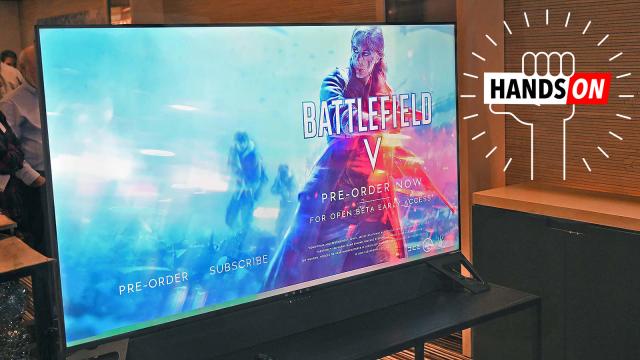A year ago, Nvidia announced plans for a series of gigantic monitors with G-sync built in, running on Android, and sporting a unique blend of features found on no other TV or computer monitor. The monitors, collectively called BFGDs (as in Big Fucking Gaming Displays), had a major issue in those early demos. They were…ugly. The displays seemed low quality, with poor dynamic range and a terrible blooming issue that might be acceptable in a $US500 ($703) TV, but not a $US5,000 ($7,025) one. But a year later, the first of those BFGD, the HP Omen Omen X Emperium 65, is finally moving out of the conceptual demo space and into purchasable reality.
And I’m excited!
Editor’s Note: We’re still waiting on Aussie pricing for this bad boy.
Before we get into why I’m excited, let’s talk about price. Because HP told me it would retail for around $US5,000 ($7,025) and that is a helluva lot of money for a 65-inch set that doesn’t even have a TV tuner built in for connecting a coaxial cable (other TV makers, including Vizio, also often skip the tuner as well). But $US5,000 ($7,025) is a standard, if steep, price for high-end televisions. Flagships from Sony, Samsung, and LG can retail for a similar price, and unlike those sets, the Omen X Emperium 65 is built with gaming, specifically PC gaming, in mind. So while many 4K TVs boast panels with a 120Hz refresh rate (which means it can refresh 120 times a second—crucial for gamers who play at high frame rates), and Samsung boasts PC gaming support (through Steam Link) and GPU syncing support (via FreeSync), the Omen X Emperium 65 and other eventually released BFGDs are intended for gaming first.
Crucially this means there’s a port on the back that can handle 4K content, with HDR, at a frame rate higher than 60FPS. Most TVs only include HDMI 2.0 ports. HDMI 2.0 supports HDR and 4K, but cannot playback anything higher than 60FPS. The Omen X Emperium 65 includes a full-size DisplayPort port, though, and that can push out a higher frame rate, plus 4K, plus HDR.
While I haven’t had the opportunity to review the new Omen X Emperium 65, HP did give me a demo of it in early December, and it revealed a very different product from what we saw last year. There’s the expected additional polish another year of development should bring, including a 3.1 surround sound soundbar that will come with the product, a neat little light that illuminates the input ports on the back of the TV on demand, and all the specs that made the BFGDs sound interesting to begin with. The panel’s 144Hz refresh rate and G-Sync support should deliver one of the smoothest PC gaming experiences on a large display to date, HDR10 support with a claimed peak brightness of 1000 nits (and a standard of 750 nits), and full array local dimming. There’s also an Nvidia Shield set-top box built directly into the TV, which means Android TV and Chromecast come built in as well. In fact, the remote for the TV is just the typical Nvidia Shield remote.
Around back there are three HDMI ports (supporting HDMI 2.0) and one DisplayPort (supported DisplayPort 1.4), that should allow you to benefit from the higher frame rates a PC rig can put out. There’s also bias lighting, which are LEDs on the back of the TV that reflect off the wall and reduce eye strain. HP claims the bias lighting will sync with the picture on the display, regardless of input, which is exciting as every other bias lighting set up on the market right now requires either a camera pointed at the display, or a box to send the TV signal through.
But the truly impressive change from January 2018 is in the display itself. It’s pretty damn gorgeous looking and a massive improvement over the previous demo. While the early product had a washed out display with terrible blooming—which is when a glowing halo appears around bright objects on a darker background—this new one resembles the exceptional LED tech you might see from a high-end set produced by Sony or Samsung. There was zero blooming, excellent contrast, and, at least in the limited content I saw, rich colours. HP claims it supports up to 95-per cent of the DCI-P3 colour space—which it should if it’s going for $US5,000 ($7,025). That’s absolutely standard and expected at that high of a price.
Tiffany Rodriquez, Product Manager for Omen Gaming Displays, says that tweaking that display was the primary focus of the team over the last year and noted that the original display had some significant issues with light leakage. She also pointed out that because the HP Omen X Emperium 65 and other upcoming BFGDs might use the same panel, modifications to that core hardware will set the devices apart.
For now, HP appears to be the first to market and own the field. Which means it will have to take own the established big set makers all on its lonesome. Will the Omen X Emperium 65, which will likely retail for over $US5,000 ($7,025), really be as good as similarly priced sets from LG, Sony, and Samsung. Will a person really be ok with putting such an obviously gamer piece of equipment in their home? I can only answer those questions with a review. So stay tuned, and if you don’t care about reviews and need a 65-inch TV built for PC gaming right this very second, the HP Omen X Emperium 65 goes on sale in February 2019.
